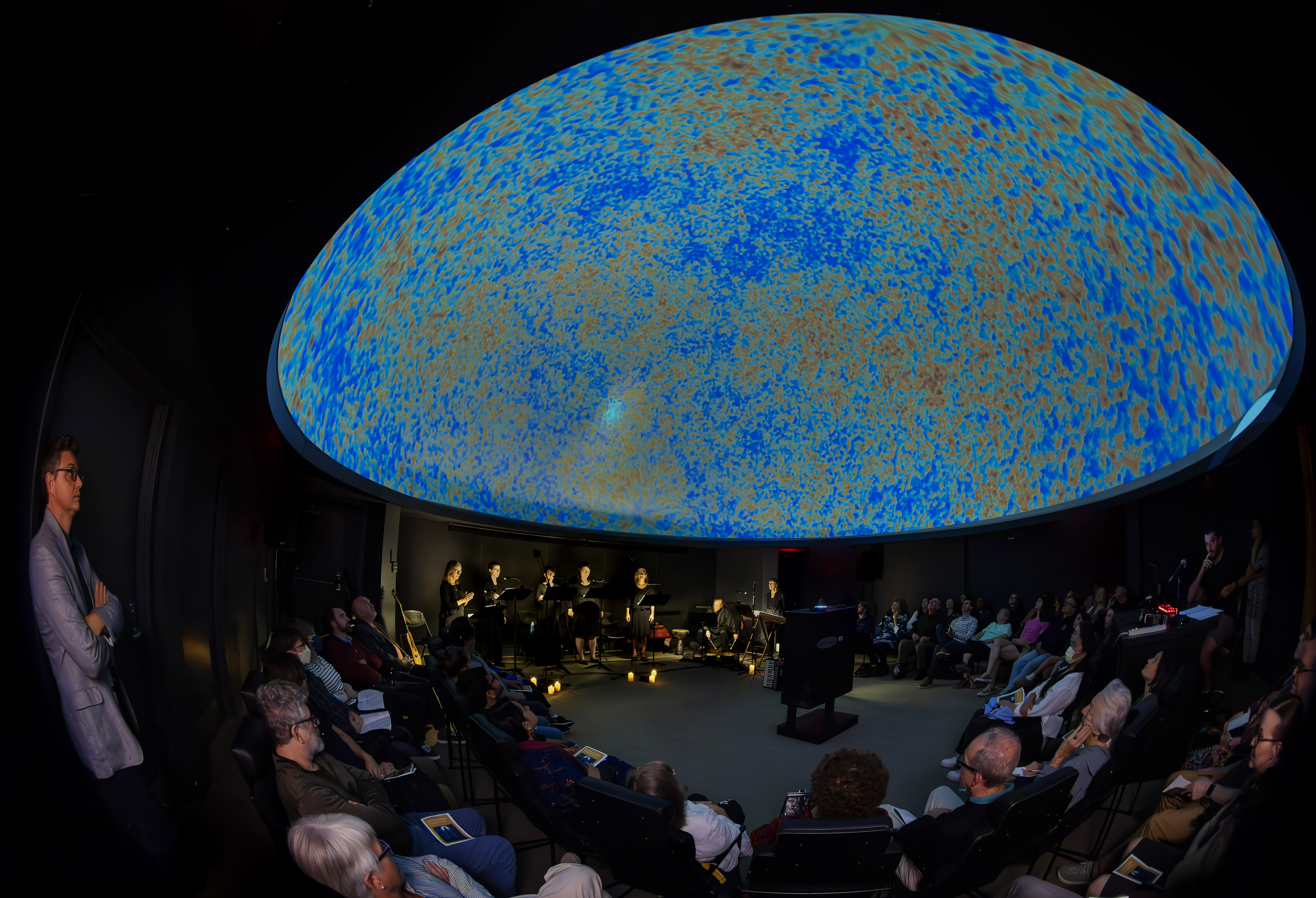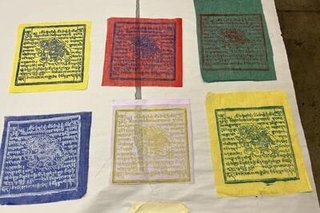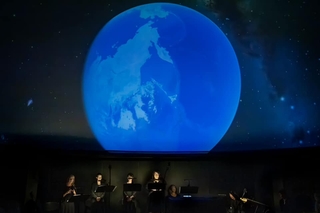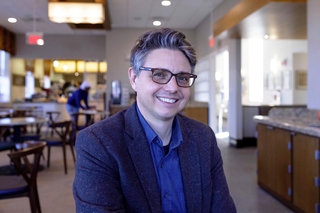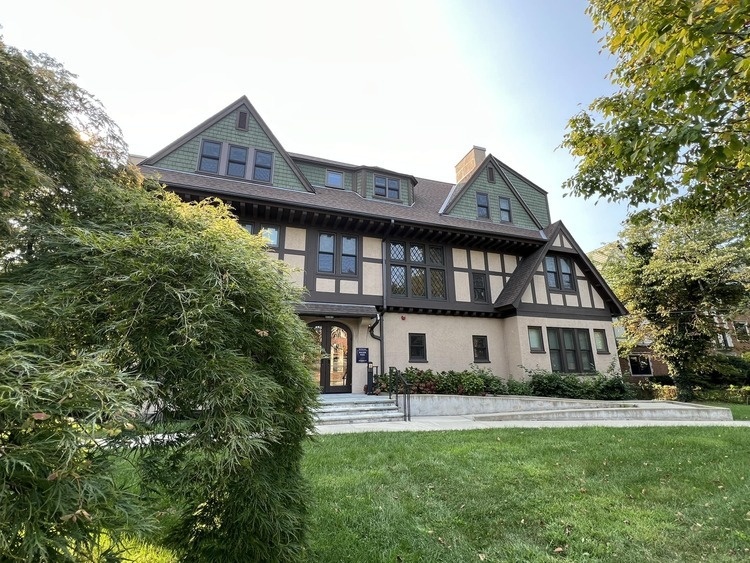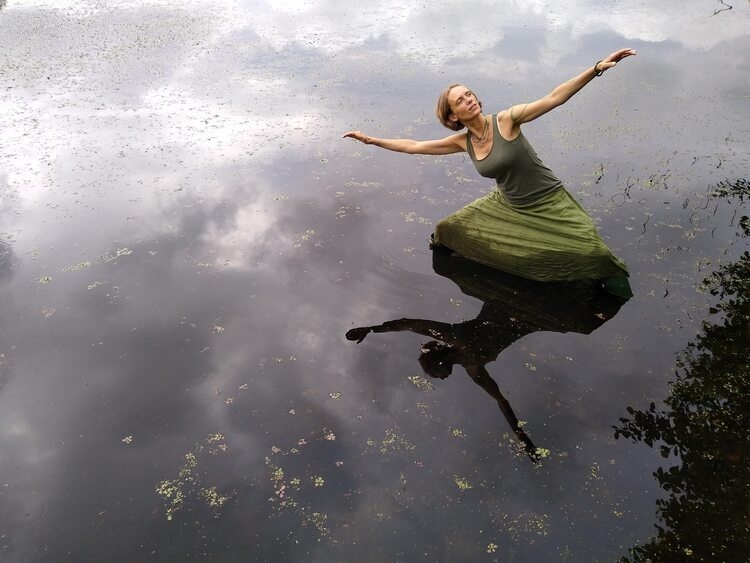Launched in January 2023, the Religion, Ecology and Expressive Culture (REEC) Initiative aims to amplify cross-disciplinary and integrative work at the intersection of religion, ecology, and expressive culture. We offer important resources to academic audiences and the broader public though events and symposia, and the funding of individual and team projects and invited project proposals from scholars across the humanities and the interpretive social sciences, as well as from artists and practitioners working on the connections linking religion, ritual, and the arts to the environment and our ongoing ecological crises.
Now accepting proposals!
Submit a proposal for a project that ties into the theme of religion, ecology, and expressive culture. Deadline is October 30.
About
The Religion, Ecology, and Expressive Culture Initiative grows out of the conviction that the study and practice of sacred music, ritual, and the related arts contributes to the scholarly work of the environmental humanities and the social and political work of addressing our ecological crises. It seeks to foster dialogue among, and disseminate the work of, scholars, artists, religious leaders, and activists from all disciplines and all religious perspectives working at the intersection of religion, ecology, and the arts.
The rapid growth of the environmental humanities as a field of research and inquiry has demonstrated that the humanities at large can play a crucial role in understanding and addressing social-environmental challenges during this period of profound environmental transformation. The Religion, Ecology, and Expressive Culture Initiative seeks to join and expand these conversations by focusing on religion and the arts as key sites in which the relation between human beings and the larger world is imagined, expressed, enacted, and transformed.
Drawing from and expanding the field of religion and ecology, this initiative fosters the study of the dynamic role of expressive culture—a capacious and open-ended concept that includes music, ritual and liturgy, theater, dance, literature, and the visual arts, among other expressive forms—in the human relationship to the non-human world. Important questions arise at the intersection of religion, ecology, and expressive culture.
- How can the study of forms of religious expressive culture help us think about environmental problems and possible solutions?
- What can comparative work from a multi-religious and globally broad view offer to a study of expressive culture and ecology?
- What other possible avenues for collaboration exist by including the voices of artists, composers, and other cultural producers in discussions about religion and ecology?
- How do environmental justice and activism intersect with religious practice and conceptions of the sacred?
We are seeking to foster and support projects from scholars across the humanities and the social sciences as well as artists and practitioners whose work engages religion, ecology, and expressive culture. Projects can work with any religious or sacred tradition or movement and any field of art or expressive culture: Buddhist chants, Jewish sacred art, Indigenous resistance movements, land art, medieval rituals, African American sacred music, new green religious ceremonies, and much more. These sacred and artistic practices can engage a wide range of environmental topics, including:
- Climate change and the Anthropocene
- Ecological and cultural sustainability
- Land, colonialism, and indigenous communities
- The agency of the more-than-human world
- Traditional ecological knowledge
- Food security
- Race, ethnicity, and environmental justice
- Environmental pollution and other toxicities
- Mass extinction and the biodiversity crisis
- Resource extraction
- Environmental activism
- The protection of waterways
- Animals and animal ethics
We hope to draw scholars, artists, religious leaders, and cultural critics into discussion about the sacred dimensions of ecological issues and the power of religion and expressive culture to address our compounding ecological crises.
The REEC Initiative primarily provides funding to facilitate the performance, presentation, or dissemination of scholarly and creative work across three themes and four specific modes of engagement (see below). Alternative forms will be considered on a case-by-case basis. Our funding is intended to support events and the public dissemination of content. Events must take place at Yale or be hosted virtually by Yale.
What we fund:
- Honoraria for event curators, speakers, and performers
- Travel and lodging when needed to stage an event
- Costs of recording, editing and producing videos of events
- Costs for advertising and event promotion
- Staff support as needed
What we cannot fund:
- Travel for research
- Research leaves
- The purchase of research materials or electronic equipment
- Costs associated with the creation of art, music, or film in advance of an event (even if it is to be used in the event)
We fund projects that speak to one or more of the following themes:
The Institute of Sacred Music invites proposals for cross-disciplinary and integrated work across the three themes (linked above) and in any of the following forms:
Symposium or Conference (Maximum: $20,000)
A symposium would bring together less than 20 presenters to share work (scholarly, artistic, etc.) around a common theme related to religion, ecology, and expressive culture. The event could be held in person on Yale’s campus or virtually (or some combined hybrid format). An in-person event would ideally be open to the Yale community and broadcast as a livestream or webinar. A virtual event would be open to the Yale community and beyond. The initiative will provide stipends to the participants and fund the costs of travel and lodging (if necessary). Yale staff will assist with event logistics and technical support. Recorded talks will be posted on the initiative’s website.
Webinar Event or Series (Maximum: $3,000)
A webinar option would be a single virtual event or series of virtual events in which speakers or panelists present on and discuss a common theme. Webinars should include time for interaction between speakers and audience. The webinars could be weekly over the course of a month or spread throughout a semester. A successful webinar will include multidisciplinary and multireligious perspectives on a theme. It might, for example, focus on the extraction of resources, the use of water in ritual and activism, or the environmental significance of a work of sacred art. We also encourage proposals seeking to speak to wider publics about issues of ecological significance. The initiative will provide a stipend for participants, offer technical support if needed, and post a recording of the events on our website.
Live or Virtual Performance (Maximum for live event, $10,000; maximum for virtual event $7,000)
Performances will engage religious and ecological themes. They will take place on Yale’s campus or be broadcast virtually (or both). Virtual performances may be live or pre-recorded. We encourage performances to be accompanied by introductions and talk-back sessions. The initiative will fund travel and lodging as well as stipends for participants. Yale staff will assist with event logistics for on-campus events and technical support if needed. Recordings will be shared on the initiative’s website.
Exhibition of Art or Material Culture (Maximum: $15,000)
Exhibitions of art or material culture must engage religious and ecological themes. The exhibition can be virtual or in-person on Yale’s campus (or include elements of each). We encourage exhibitions to be accompanied by workshops, panels, or lectures. For on-campus events, Yale staff will provide logistical support. A stipend will be provided to curators and speakers. Recorded elements and photographs of the exhibition can be posted on the initiative’s website.
Other
We welcome proposals that creatively expand possible forms of engagement beyond those listed above (e.g. public events, podcasts, film, digital humanities projects, etc.). We are especially interested in proposals that aim for public and political relevance. If you are uncertain about an idea, you are welcome to reach out to ISMecology@yale.edu(link sends e-mail).
Application Information
The ISM seeks applications by, or nominations for, scholars, artists, religious leaders, activists, and others in related fields. Applicants should be able to demonstrate sufficient expertise, experience, and time to realize their proposed event or project. We encourage interdisciplinary teams to apply together.
The focus of the initiative is to support and amplify the work of people outside of Yale and to share that work with the Yale community and beyond. No affiliation with Yale is required or expected of applicants. If you are a Yale faculty member and would like to propose an event related to this initiative, please send an inquiry by email.
Contact us for more information about ISM funding internal to Yale.
The application process occurs in two phases, which are outlined below. Application materials can be submitted here. (The next round of applications opens on October 1, 2025).
Phase I:
The first phase requires the submission of the following materials via the online application portal.
-
A short summary of the project, including:
-
the specific form of engagement, and
-
the theme or themes the project engages (maximum 1000 words). Please also outline some of the ways this project might engage the Yale community.
-
-
A list of potential participants with brief biographies.
-
A proposed timeline for the project, from planning to execution.
-
A CV or resume of applicant(s).
Phase II:
The committee will select several proposals to move on to the second phase. If your proposal is selected, you will be invited to have a conversation with ISM staff members. You may also be asked to submit further information. The following information may be requested at this stage.
-
A more detailed description of the proposed event. We are likely to have specific clarificatory questions for you to address at this stage.
-
Detailed information related to costs that we can use to create a budget for the event.
-
A list of confirmed participants.
- The committee may request a reference at this stage.
Applications for funding are accepted annually. For the 2025-26 academic year, the application deadline will be October 30, 2025. All application materials should be submitted on time. The next round of applications opens on October 1, 2025 and closes on October 30, 2025.
Phase I applications will be reviewed by the Religion, Ecology, and Expressive Culture initiative faculty committee, which consists of Yale faculty from across the university. We aspire to communicate decisions about first-round applications within eight weeks, although it can be hard to gather the committee. If you have not heard within eight weeks, feel free to reach out and inquire about our timeline.
Phase II is more dialogical. It may require several conversations and email exchanges. Our goal at this stage is to fully understand the event in order to ensure that it is doable within our budget and with our staff resources. It can take several weeks to a month.
Applicants should build the timeline of the review process into their planning. As a general (though not exceptionless) rule, we expect proposals submitted for consideration in a given academic year to occur the following academic year either in the fall semester or spring semesters. Accordingly, applicants submitting a proposal in October 2025 should plan for their event to be held in Fall 2026 or Spring 2027.
If you think the work of some scholar(s), artist(s), or practitioner(s) fits particularly well with the aims of this initiative, we invite you to nominate them. Nominations can be submitted by email here. Please include name(s), institutional affiliation(s), and a short rationale for the nomination.
Three Themes
-
Extraction and Disposal in Expressive Culture
The extraction of natural goods – water, rock, metals, minerals, etc – is a key moment in the human relationship to the more-than-human world.
-
Ritual Natures: Expressive Culture and the Natural Forms of Trees, Water, and Rocks
The natural forms of trees, rocks, and water have long been central to ritual practices across a wide range of religious traditions.
-
Sacred Cosmologies, Environmental Change, and Expressive Culture
Stories of cosmic creation link sacred histories with ritual and worship practices and contemporary social and environmental action.
News
-
Call for proposals for events at intersection of religion, ecology, and expressive culture
Proposals for conferences, performances, exhibitions, webinars, and discussions are welcome until the deadline of October 30.
-
Eben Graves promoted to be associate director of the ISM
Congratulations to Dr. Eben Graves who has been promoted to the position of associate director of the Yale Institute of Sacred Music.
-
The ISM to host Andromeda Turre in “Homegrown Dialogues"
On Saturday, Sept. 20, the Yale Institute of Sacred Music will host a daylong symposium featuring award-winning vocalist and composer Andromeda Turre.
Upcoming Events
-
-
Healing with More-than-Humans: Environment, Historicities, and Sacred Materialities
(multi-day event)In-Person -
